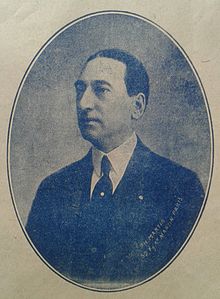Henri Christiné
Henri Marius Christiné (born December 27, 1867 in Geneva , † November 23, 1941 in Paris ) was a Swiss-French composer.
Life
Christiné initially worked as a high school teacher in Geneva and played the piano and organ as a hobby. For his future wife, who was a singer, he wrote the first chansons that were so successful that he decided to give up teaching. He first moved to Nice , then finally to Paris in 1896, where he was naturalized.
At first he was successful as a composer of songs and couplets , which were soon interpreted by the famous Parisian chanson greats and quickly made Christiné a sought-after composer. Among the interpreters of his songs were Mayol , Polin , Yvonne Printemps , Georgius , Mistinguett , Maurice Chevalier , Michel Simon , Fernandel and Fragson .
The composer made his first attempts at the theater after the turn of the century. His first operettas came out from 1903 in Brussels and Paris, but they did not yet bring any resounding success. This changed with a work by Christiné, which was written in the last weeks of the First World War and premiered on November 12, 1918, the day after the armistice. Phi-Phi , a small work about the ancient sculptor Phidias in the tradition of Offenbach's antique subjects, was actually planned for the smallest cast in an air raid shelter theater, the impresario Gustave Quinson finally decided to publish the work on the Bouffes-Parisiens , for which it is was expanded and orchestrated for a small entertainment orchestra (instead of the originally intended string quartet). This created a small form of the chamber operetta, which became the style- defining operetta-légère for the twenties. Maurice Yvain and André Messager also wrote in the genre that dispensed with a choir and instead brought an ensemble of singing and dancing actors and a girl group onto the stage, accompanied by a 'jazzed on' chamber orchestra.
Phi-Phi's librettist , the French Albert Willemetz , who was Clemenceau's main job as secretary , became one of the busiest operetta writers of the interwar period with this work. He wrote texts for couplets and stage works by Christiné until his death. From 1923 onwards, the two of them also wrote larger-format operettas, which were subtitled as Comédies musicales ( i.e. with the French translation of the Anglophone term musical comedy ).
Due to the multiple filming of Dédé , but also with couplets played in films, Christiné's music was recorded in cinema and television. Various operetta anthologies document his work on CD.
Works
- Service d'amour , Brussels 1903
- Les Vierges du harem , Brussels 1907
- Cinq minutes d'amour , Paris 1908
- La petite Tonkinoise , 1908
- L'amour qui rit , 1912
- Phi-Phi , Paris 1918
- Dédé , Paris 1921
- Madame , Paris 1923
- PLM ("Express Train Paris-Lyon-Méditerranée"), Paris 1925
- J'adore ça! , Paris 1925
- J'aime! , Paris 1926
- Picador , 1926
literature
- Volker Klotz : Operetta. Portrait and manual of an unheard of art , Munich (Piper) 1991, ISBN 3492030408 ; extended new edition Kassel (Bärenreiter), 2006
Web links
- Biography on the website of the Université de Napierville (French)
- List of works at operone.de
- Henri Christiné in the Internet Movie Database (English)
Audio sample
- Ah! Les grandes femmes , Chanson, Alfred Nohcor 1916, (mp3, 1.6 MB)
| personal data | |
|---|---|
| SURNAME | Christiné, Henri |
| ALTERNATIVE NAMES | Christiné, Henri Marius |
| BRIEF DESCRIPTION | Swiss-French composer |
| DATE OF BIRTH | December 27, 1867 |
| PLACE OF BIRTH | Geneva |
| DATE OF DEATH | November 23, 1941 |
| Place of death | Paris |
